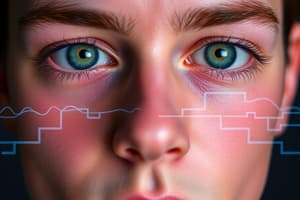Podcast
Questions and Answers
What is sensation?
What is sensation?
- The process of interpreting sensory information
- The process of ignoring sensory information
- The process of detecting sensory information by specialized neurons called sensory receptors (correct)
- The process of both detecting and interpreting sensory information
What is perception?
What is perception?
- The process of interpreting sensory information
- The process of ignoring sensory information
- The process of detecting sensory information by specialized neurons called sensory receptors
- The process of both detecting and interpreting sensory information (correct)
What is sensory adaptation?
What is sensory adaptation?
- The process of interpreting sensory information
- The process of detecting sensory information by specialized neurons called sensory receptors
- The ability to detect a difference between two stimuli
- The phenomenon where constant stimuli are no longer perceived over prolonged periods of time (correct)
What is inattentional blindness?
What is inattentional blindness?
What is signal detection theory?
What is signal detection theory?
What is the just noticeable difference (jnd)?
What is the just noticeable difference (jnd)?
What is Weber's law?
What is Weber's law?
What are subliminal messages?
What are subliminal messages?
Flashcards are hidden until you start studying
Study Notes
Sensation and Perception: The Basics
- Sensation is the process of detecting sensory information by specialized neurons called sensory receptors.
- Perception refers to how sensory information is interpreted and consciously experienced.
- Sensory receptors respond to specific types of stimuli, and transduction is the conversion of sensory stimulus energy to action potential.
- Perception involves both bottom-up processing (driven by sensory information) and top-down processing (driven by knowledge and expectancy).
- Sensory adaptation is the phenomenon where constant stimuli are no longer perceived over prolonged periods of time.
- Attention plays a significant role in determining what is sensed versus what is perceived, and inattentional blindness is the failure to notice something that is visible because the person is attending to something else.
- Motivation to detect a meaningful stimulus can shift our ability to discriminate between a true sensory stimulus and background noise, and signal detection theory explains the ability to identify a stimulus when it is embedded in a distracting background.
- Our perceptions can be affected by our beliefs, values, prejudices, expectations, and life experiences.
- We have more than five senses, including balance, body position and movement, pain, and temperature.
- The just noticeable difference (jnd) or difference threshold is the amount of difference in stimuli required to detect a difference between them, and it changes depending on the stimulus intensity.
- Weber’s law states that the difference threshold is a constant fraction of the original stimulus.
- Subliminal messages are messages presented below the threshold for conscious awareness, and research evidence shows that people can process and respond to information outside of awareness, but hidden messages have little effect on behavior outside the laboratory.
Studying That Suits You
Use AI to generate personalized quizzes and flashcards to suit your learning preferences.




